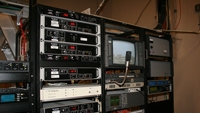Sprint completes BAS spectrum transition

The project began before President Obama was elected or there was even the idea of a National Broadband Plan. But over five years, Sprint has freed 35MHz of bandwidth by replacing roughly 100,000 pieces of microwave transmission ENG equipment at more than 1000 stations across the country.
Last week, Sprint announced that it has completed the $750 million transition of 2GHz broadcast auxiliary service (BAS) spectrum begun in 2005. The achievement, said the wireless carrier, establishes a new, more efficient spectrum band plan that clears the way for millions of consumers nationwide to gain faster and cheaper access to broadband services.
“Sprint’s completion of the BAS spectrum transition marks an important step toward President Obama’s goal of freeing 500MHz of additional wireless broadband spectrum,” said Michael B. Degitz, vice president, Spectrum Management for Sprint.
More than 1000 engineers, technicians, tower climbers and laborers worked to replace aging microwave and electronic newsgathering equipment with new equipment that is capable of operating more efficiently while using less spectrum. Key equipment suppliers included Microwave Service Company, Nucomm and RF Central (all part of the RF Extreme division within The Vitec Group), whose digital microwave transmitters and recievers now operate within a new frequency band to allow stations to gather and air live breaking news.
Sprint notified the FCC of the BAS project’s completion in a regulatory filing on July 15, when it completed the Anchorage, AK, designated market area. Anchorage was the last of 213 markets to be transitioned.
Sprint began the BAS spectrum transition project following the 2004 FCC decision to implement a plan to resolve ongoing interference between public safety and commercial operations in the 800MHz band. Sprint’s financial and spectrum contributions to the FCC’s 800MHz Reconfiguration Plan included retuning BAS incumbents to a new, more efficient band plan, thus clearing the 1990MHz-1995MHz spectrum block for Sprint and the 1995MHz-2025MHz block for mobile satellite and future broadband services.
The professional video industry's #1 source for news, trends and product and tech information. Sign up below.
